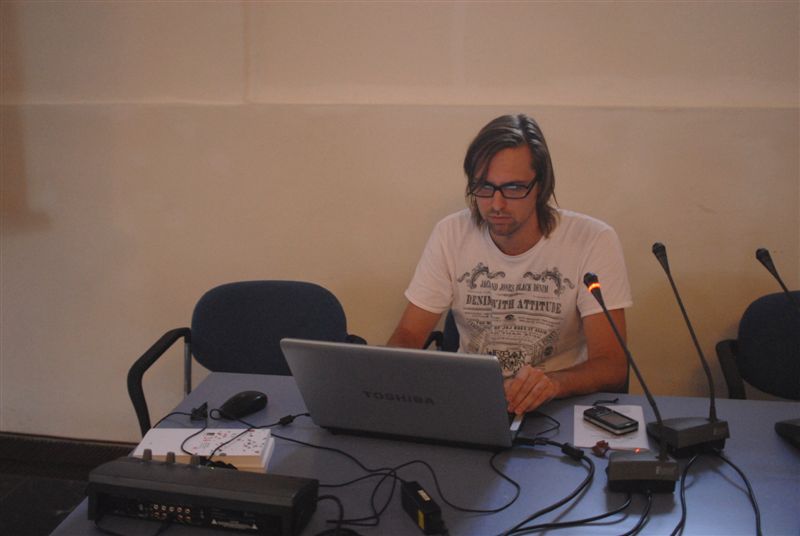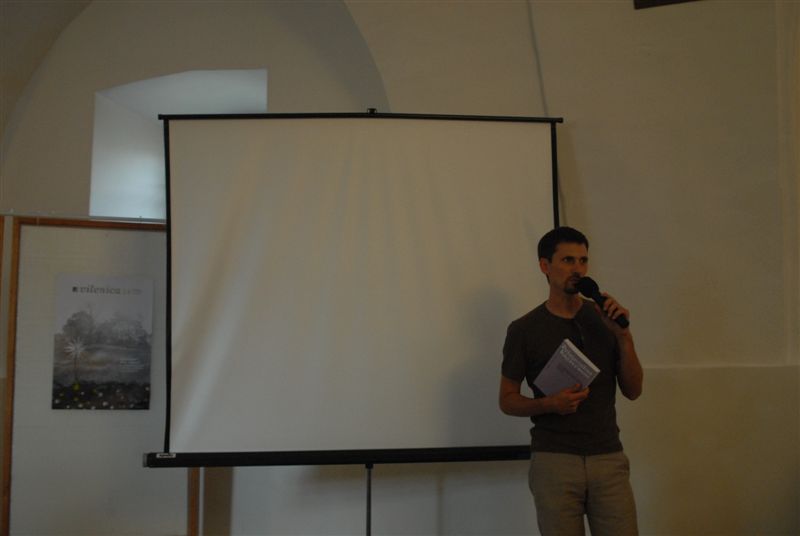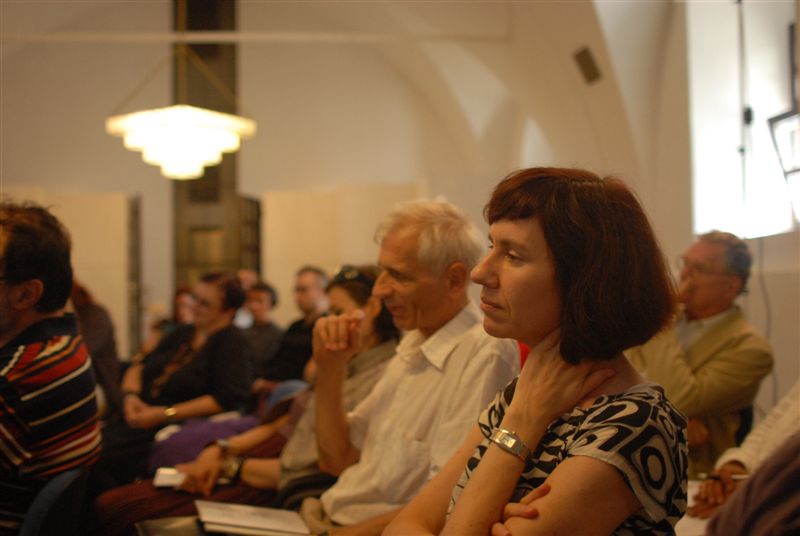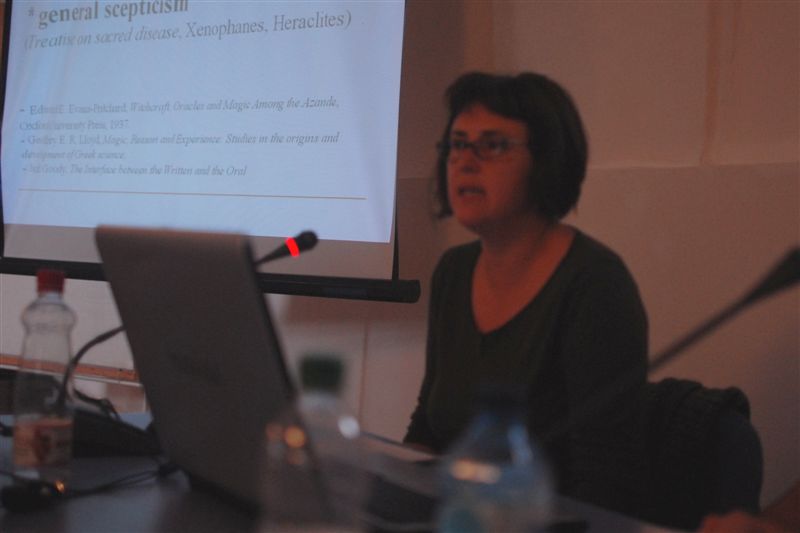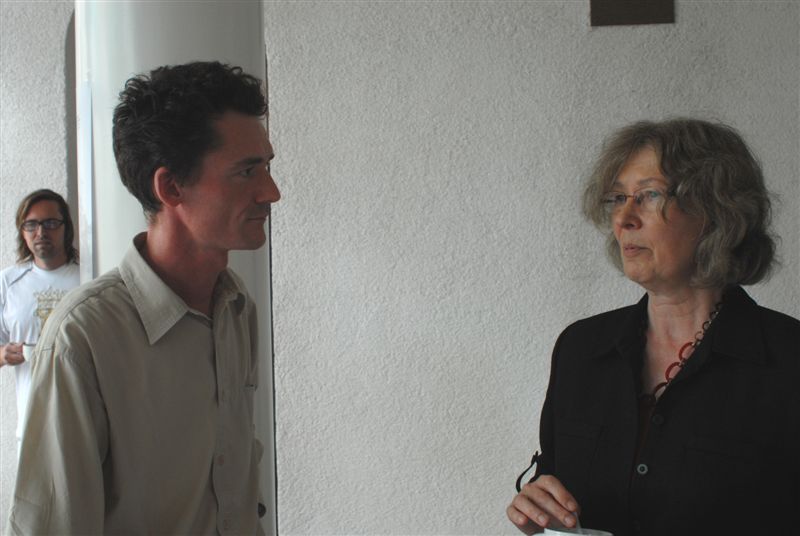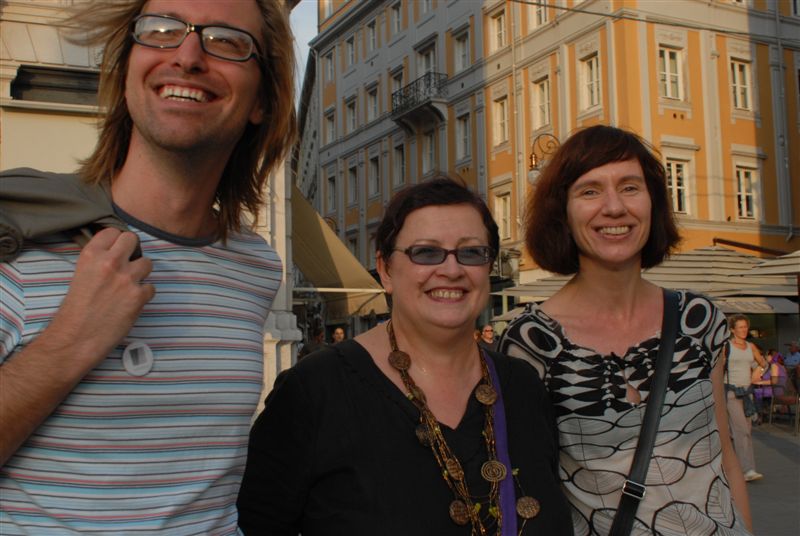VII.
Mednarodni komparativistični kolokvij
7 th
International Comparative Literature Colloquium
7
"Kdo izbere?" Literatura in literarno posredništvo
"Who Chooses?" Literature and Literary Mediation
(program in povzetki referatov / programme and paper abstracts)
fotografije / photos
24. Mednarodni
literarni festival Vilenica
24th
Vilenica International Literary Festival
Lipica, Poročna dvorana / Lipica, Wedding Hall, 3.-4 september 2009
Udeleženci /
Participants
Els ANDRINGA
Univerza v Utrechtu,
Oddelek za
primerjalno književnost, Utrecht, Nizozemska / The Netherlands
Maja BREZNIK
Mirovni inštitut, Ljubljana, Slovenija /
Slovenia
Darko DOLINAR
ZRC SAZU, Inštitut za slovensko literaturo in literarne vede, Ljubljana,
Slovenija / Slovenia
Marijan DOVIĆ
ZRC SAZU, Inštitut za slovensko literaturo in literarne vede, Ljubljana,
Slovenija / Slovenia
Jernej HABJAN
ZRC SAZU, Inštitut za slovensko literaturo in literarne vede, Ljubljana,
Slovenija / Slovenia
Miha KOVAČ
Univerza v Ljubljani, Filozofska fakulteta, Oddelek za bibliotekarstvo,
informacijsko znanost in knjigarstvo, Ljubljana, Slovenija / Slovenia
Eric METZ
Univerza v Gentu, Oddelek za slovanske in vzhodnoevropske študije, Gent, Belgija
/ Belgium
Slavomíra PORUBSKÁ
Univerza v Münchnu, München, Nemčija / Germany
Margrit SCHREIER
Univerza Jacobs, Šola za humanistične in družboslovne vede, Bremen, Nemčija /
Germany
Jola ŠKULJ
ZRC SAZU, Inštitut za slovensko literaturo in literarne vede, Ljubljana,
Slovenija / Slovenia
Aleš VAUPOTIČ
Visoka šola za dizajn, Ljubljana, Slovenija / Slovenia
Andrew WACHTEL
Univerza Northwestern, Podiplomska šola, Evanston, ZDA / USA
Koncept kolokvija / Concept of the colloquium
Marijan DOVIĆ
Moderatorji / Moderators
Marijan DOVIĆ, Jernej HABJAN, Aleš VAUPOTIČ
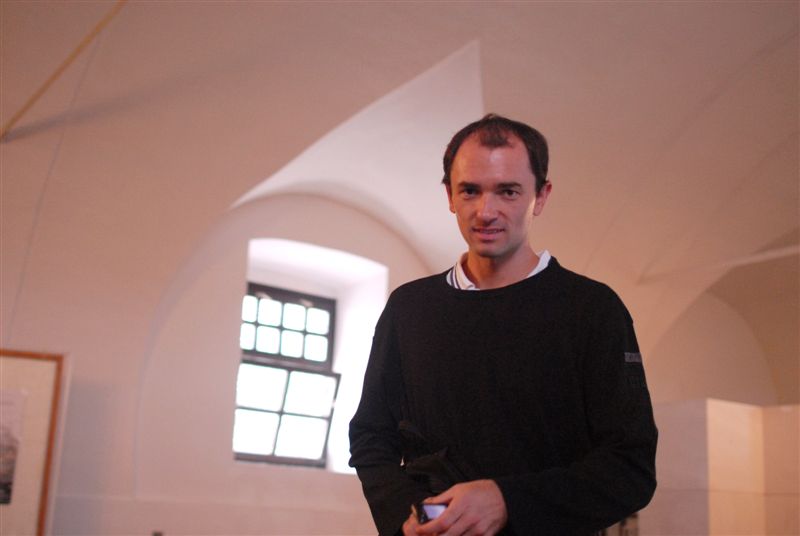

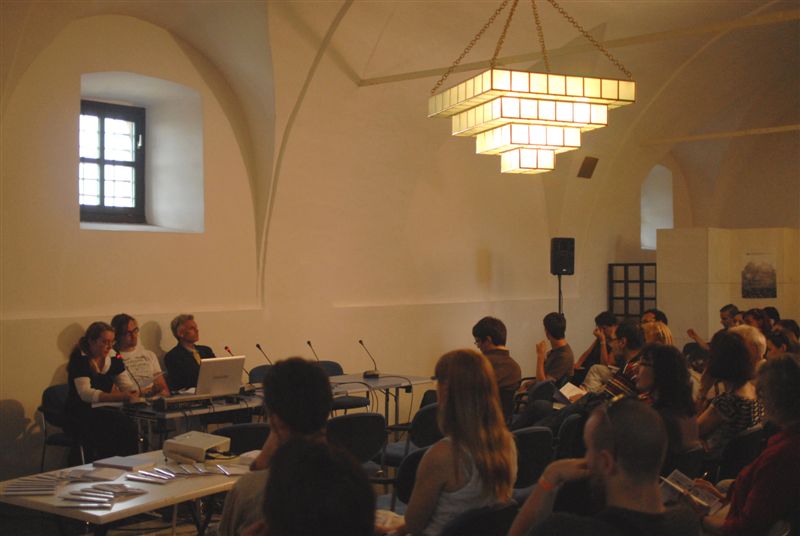
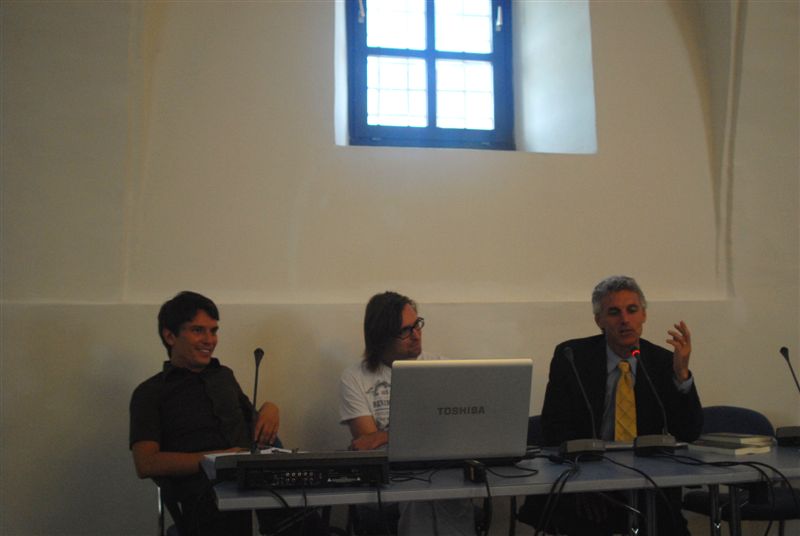
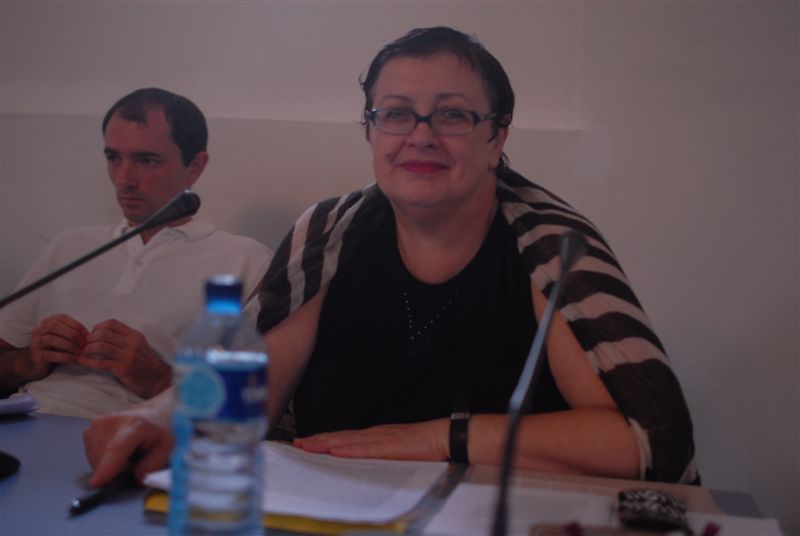
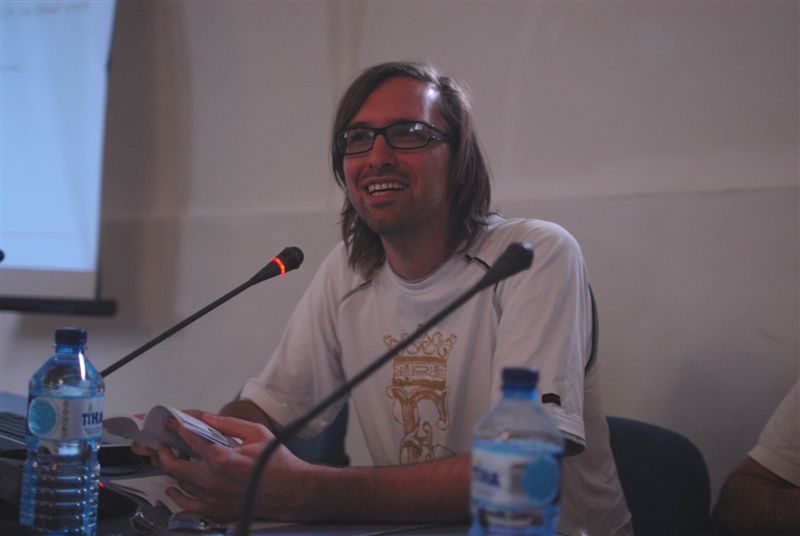
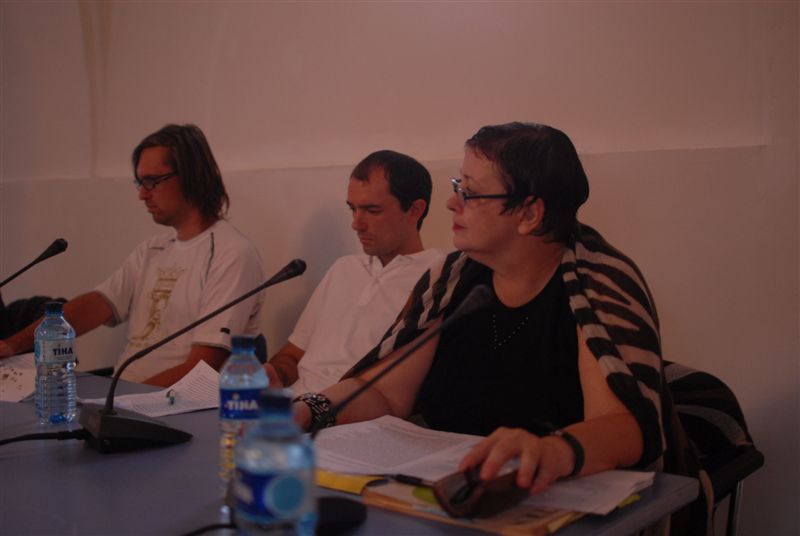
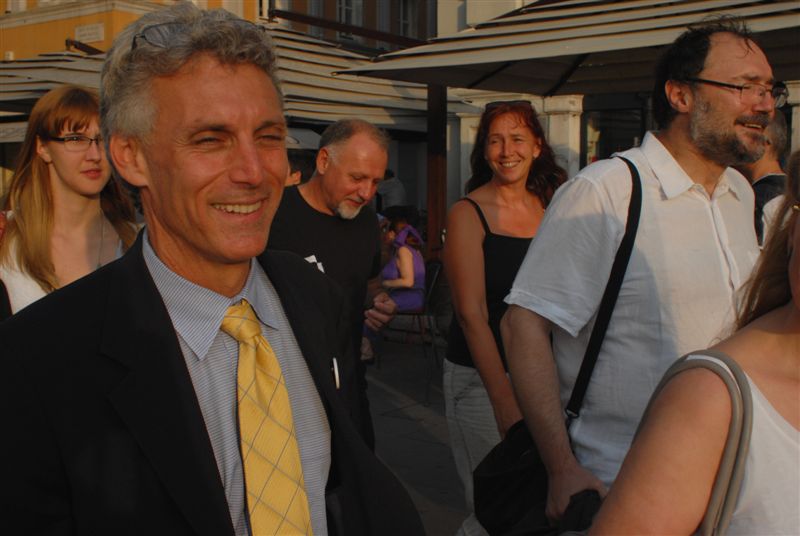
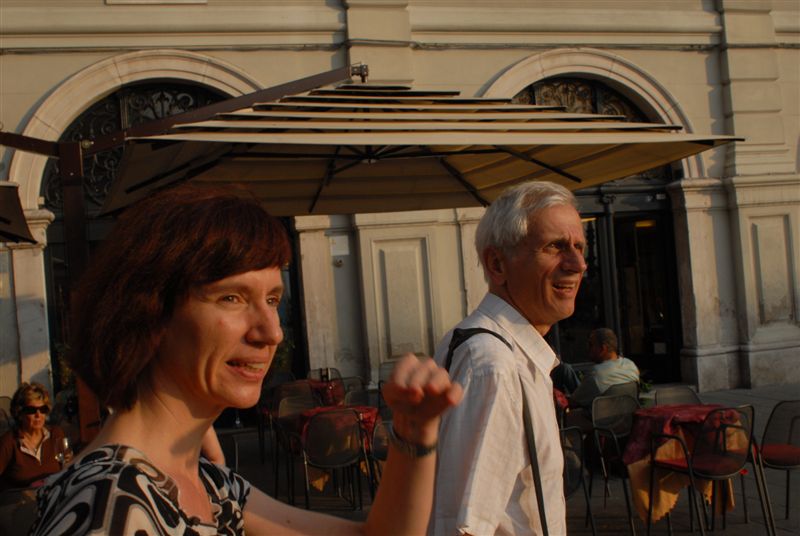
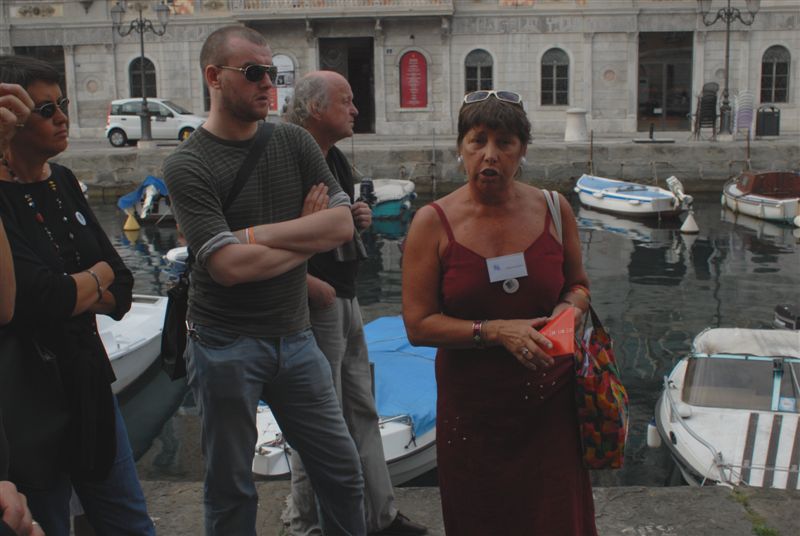
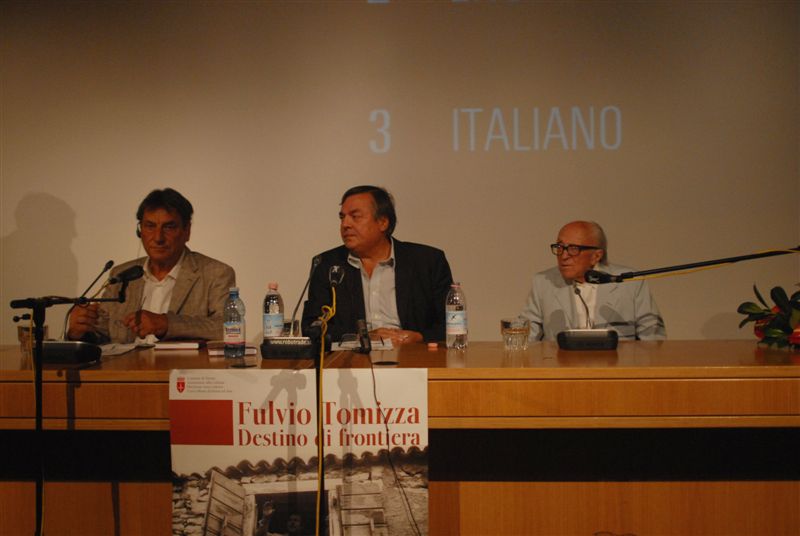
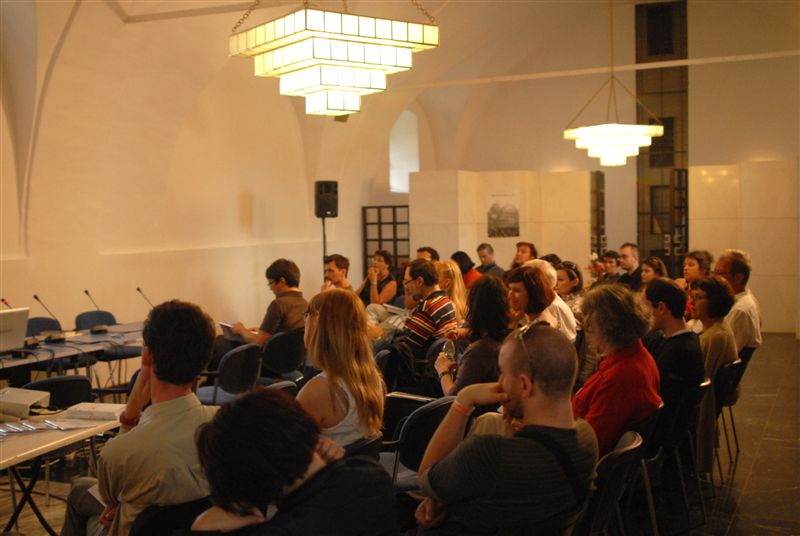
PROGRAM KOLOKVIJA / THE PROGRAMME OF THE
COLLOQUIUM
Četrtek, 3. septembra / Thursday, September 3rd
14.00 Pozdravni nagovor / Opening address
Vanesa MATAJC, predsednica SDPK / SiCLA president
14.10 Predstavitev posebne številke revije Primerjalna književnost / Presentation of a special edition of the Comparative Literature review
Gašper TROHA, sourednik / co-editor
14.20 – 17.00 Prvo zasedanje / First session (moderator: Marijan Dović)
14.20 – 15.00
Marijan DOVIĆ: Kdo izbere? Uvodne pripombe / Who Chooses? An Introduction
Andrew WACHTEL: Ustvarjanje literarnega kanona Vzhodne Evrope v angleškem jeziku: urednikovo gledišče / Creating an English Language East European Literary Canon: An Editor’s Perspective
15.00 – 15.30 Diskusija / Discussion
15.30 – 16.00 Odmor / Coffee break
16.00 – 16.40
Darko DOLINAR: Kdo izbere? / Who Chooses?
Miha KOVAČ: Konec angleškega imperija? Ali nekaj drugega? / End of English Empire? Or Something Else?
16.40 – 17.00 Diskusija / Discussion
17.05 Odhod na literarna branja v Trst (izpred Hotela Maestoso) /
Leaving for literary readings in Triest (bus departs from the Maestoso Hotel)
Petek, 4. septembra / Friday, September 4th
10.00 – 11.20 Tretje zasedanje / Third session (moderator: Aleš Vaupotič)
Maja BREZNIK: Splošni skepticizem v umetnosti / General Scepticism in Art
Jola ŠKULJ: Politike branj / Politike diseminacije /
Politics of Readings / Politics of Dissemination
Jernej HABJAN: Kdo izbere tistega, ki izbere? O vsiljeni izbiri shakespearovske epistemologije in tekstologije / Who Chooses the One Who Chooses? On a Forced Choice of Shakespearean Epistemology and Textology
Els ANDRINGA: Nizozemski literarni polisistem v obdobju nemškega eksila (1930–1940) / The Dutch Literary Polysystem in the Period of German Exile, 1930–1940
11.20 – 11.50 Diskusija / Discussion
11.50 – 12.20 Odmor / Coffee break
12.20 – 13.40 Četrto zasedanje / Fourth session (moderator: Jernej Habjan)
Slavomíra PORUBSKÁ: Kdo izbere prevodno literaturo? Empirična pilotska študija prevajalskih subvencij v Nemčiji / Who Chooses Literature in Translation? An Empirical Pilot Study on Translation Subsidies in Germany
Margrit SCHREIER: »Je mogoče podeliti šest od petih zvezdic?!« Izbor in priporočanje knjig v dobi interneta / “Is it possible to give a six out of five stars?!” Book selection and recommendation in the age of the internet
Eric METZ: Irena Karpa in nastajanje mlade ukrajinske literature / Irena Karpa and the Making of Young Ukrainian Literature
Aleš VAUPOTIČ: Kdo izbere, kaj bralec bere? (Kibertekstualna perspektiva) / Who Chooses, What the Reader Reads? (A Cybertextual Perspective)
13.40 – 14.20 Diskusija in sklepne besede / Discussion and conclusion
14.30 Kosilo v hotelu Klub / Lunch at the Club hotel
15.30 Odhod v Ljubljano / Transport to Ljubljana *
17.00 Literarna branja v Ljubljani / Literary readings in Ljubljana
* vrnitev v Lipico pozno zvečer / return to Lipica late at night
Marijan Dović
»Kdo izbere?« Literatura in literarno posredništvo
(Koncept kolokvija)
Ukvarjanje z vprašanjem Kdo izbere? se le izjemoma znajde v središču resnega zanimanja literarnih strok. Nasprotno, celo v klasični literarnosociološki perspektivi, osredotočeni na trojček avtor-delo-bralec, se zdi nekoliko odrinjeno – kot da bi bilo preveč trivialno. Boljše izhodišče za njegovo konceptualizacijo ponujajo izpeljanke komunikacijskega modela Romana Jakobsona, a zares sistematično se možnosti za njegovo preučevanje začrtajo šele v novejših sistemskih pogledih na literaturo, na primer pri Niklasu Luhmannu, Pierru Bourdieuju ali Siegfriedu J. Schmidtu. Schmidt v svojem empiričnem teoretskem modelu med štirimi tipi vlog, ki jih lahko privzemajo udeleženci v literarnem sistemu, poleg literarnega proizvajalca, sprejemnika in obdelovalca upravičeno utemelji tudi vlogo literarnega posrednika kot enega izmed stebrov znotrajsistemske komunikacije. Podobno v Bourdieujevem sociološkem modelu kulturnega oziroma literarnega polja izstopi posredniška funkcija kot mesto, v katerem se najbolj očitno prepletajo silnice nasprotujočih si tipov kapitala, ekonomskega in simbolnega; ravno v umetnosti takšno križanje proizvaja najbolj kontradiktorne učinke. Raziskave dinamike in interakcij literarnih polisistemov (Itamar Even-Zohar) so ravno tako pokazale na pomembno vlogo literarnega posredništva pri gradnji (nacionalnih) literarnih repertoarjev – predvsem z vidika inovacij in vplivov, ki prihajajo v ciljne sisteme prek prevodnega literarnega korpusa.
Klasični instituciji literarnega posredništva v modernih evropskih literarnih sistemih sta predvsem literarna revija in (literarna) založba. Literarna sociologija (Norbert Groeben, Hugo Verdaasdonk, Kees Van Rees …) je natančno raziskala potovanje »novitet« skozi mehanizme trga in medijev ter empirično opisala njegovo dinamiko. Pot literarnih del skozi uredniške filtre, recenzijske in kritične odzive ter esejistične obdelave, da bi se na koncu podvrgla še obravnavi literarnih strok, ki jih skozi postopke kanonizacije na različne načine vračajo v kulturni prostor, je postala legitimen predmet raziskav vsaj odtlej, ko se je v literarni vedi uveljavilo zanimanje za literarni kanon. Toda če želimo ostati zavezani našemu temeljnemu vprašanju Kdo izbere?, moramo premisliti tudi tisto, kar se dogaja pred tem – vse tisto torej, kar je priljubljen predmet kavarniških debat, zelo redko pa sistematične refleksije.
Ni težko ugotoviti, da bo odgovore treba iskati ob figuri ali, natančneje, ob funkciji revijalnega in še bolj založniškega urednika. »Urednik« nas zanima kot teoretični model in hkrati kot historična figura v različnih družbenih, političnih in ekonomskih razmerah. »Urednik« je točka, v kateri se svet umetnosti križa s svetom ekonomije; z eno nogo stoji v svetu neizmerne svobode avtorskega ustvarjanja, značilne za moderne umetnostne sisteme, a je obenem z drugo nogo trdno zasidran v neki strukturi, neki hierarhiji (ekonomija/politika). Vsekakor predstavlja tisto figuro, ob kateri se pisatelj, če noče pristati v obskurnosti, de facto mora srečati z ekonomskim redom družbe, ki šele omogoča, da njegovi artefakti ugledajo luč sveta.
Urednik je seveda najprej posameznik z individualnim estetskim okusom, in dobri uredniki so pogosto tudi idealni porodničarji besedila, včasih celo njegovi (so)avtorji. Vendar nas bolj kot takšna »majevtična« vloga urednika tu zanima njegova funkcija odločevalca. V to funkcijo se v praksi vpleta kompleksna mreža dejavnikov, ki lahko »soodločajo« z urednikom in torej definirajo tisto, kar se v dani situaciji »izbere«, s tem pa seveda odločajo tudi o tem, kaj se v neki kulturi sploh »bere«. Koncept okusa, kolikor je že sam po sebi zapleten in problematičen, je torej vrh vsega nezadosten, in upoštevati je treba še niz drugih parametrov.
Eden izmed njih je povezan z že omenjenim dejstvom, da je moderni urednik hkrati del organizacijske strukture založbe, torej del njene notranje hierarhije, ta pa je v končni instanci omejena s trgom, s pozitivno bilanco poslovanja. Urednik torej vedno razmišlja tudi s »šestim čutom« za tržni uspeh. Kadar pa je sistem reguliran drugače, netržno, in na različne načine subvencioniran, se moramo seveda vprašati, v kolikšni meri aktivna ali pasivna oblika politike izbira namesto urednika ali z njim. Tu je mogoče obravnavati širok razpon problemov, pa naj gre za tiho izključitev protirežimskih del v reguliranih založbah totalitarnih sistemov ali za sodobne primere pozitivne diskriminacije marginalnih skupin. Sem sodijo tudi strokovne komisije in ekspertni bralci, njihova sestava in načini imenovanja, ali pa seznami del, katerih prevod založbam avtomatično zagotovi subvencije; vse to so načini, kako (kulturna) politika prenaša v otipljivo prakso rezultate nenehnega obnavljanja znotrajsistemske razmejitve med »umetniškim« in »trivialnim«. Še en parameter, ki ga je treba ob vsem tem upoštevati, je seveda cenzura, ki jo spet lahko razumemo v širokem razponu od eksplicitne avtoritarne oblike prek perfidne komunistične (samo)cenzure do sodobne legalistične različice, ki se kaže v možnosti neugodnih defamacijskih tožb.
Doslej omenjeni načini »pomoči« uredniku pri procesu izbire se nanašajo tako na korpus, ki ga ustvarjajo domači avtorji, kot tudi na prevodni korpus, ki je ravno tako vedno posredovan prek uredniških izbir. Vendar je treba oba v nekaterih pogledih teoretsko ločiti in pri vsakem upoštevati še dodatne dejavnike. Pri selekcijskih procesih pri prevodni literaturi – in ta je šele omogočila skupen duhovni prostor »svetovne književne republike« – je treba začeti na mikro nivoju in preučiti vlogo malih kulturnih posrednikov, kulturnih dvoživk, entuziastičnih prevajalcev, ki pogosto motivirajo založnike ciljnih literatur, in njihovih nagibov. Po drugi strani je treba preveriti rastočo vlogo literarnih nagrad na eni in medijskega zvezdništva na drugi strani kot pomembnih katalizatorjev prevajanja določenih del. S tem v zvezi se ni mogoče izogniti vprašanju mednarodnih kulturnih strategij in aktivnih promocijskih politik ter očitne asimetrije pri nastajanju nadnacionalnih kanoničnih formacij, »svetovne« ali »globalne« literature, ki je odmevalo v sodobni komparativistiki (Franco Moretti, Pascale Casanova, David Damrosch …).
V zvezi z domačo literaturo ne bi smeli spregledati, da udeleženci v literarnem sistemu različne vloge največkrat prevzemajo simultano, tako da te ostajajo v nenehni napetosti, kar še posebej velja za posredniško vlogo. Predvsem kombinacija vloge proizvajalca in (vplivnega) posrednika je zanimiva z vidika koncentracije simbolnega kapitala in s tem moči v kulturnem polju. V preteklosti najdemo nemalo primerov, ko je takšna kombinacija učinkovito promovirala posamezne literarne struje, skupine, generacije ali zgolj ambiciozne klike. Potencialni konflikt interesov, ki je položen vanjo, tudi v prevodni literaturi nemalokrat spodbuja vezano trgovino, kompenzacijske dogovore »pod mizo« o prevodih in izdajah po načelu »roka roko umije«. Vpliv distribucije pozicij moči in delovanja neformalnih družabnih omrežij znotraj literarnega polja na kariere posameznih avtorjev, skupin in smeri, ki je sicer na predteoretski ravni pogosto reflektiran, nikakor ni raziskan dovolj sistematično.
Ne nazadnje moramo literarnoposredniško vlogo postaviti v časovno perspektivo, kajti literarnim sistemom, kakršne poznamo od 18. oziroma 19. stoletja naprej, se v prihodnosti obetajo korenite spremembe. Poleg doslej omenjenih tem nas torej zanimajo še historični problemi razvoja uredniške vloge, modeli založniških ureditev (kapitalizem, socializem …), njihove spreminjajoče se ideološke podlage, pa tudi specifični problemi posredništva v malih in velikih (dominantnih) literarnih sistemih. Ob historizaciji izhodiščnega vprašanja se bo jasneje pokazala tudi radikalnost, s katero vlogi avtorja in literarnega posrednika problematizirajo novomedijske literarne prakse.
Marijan Dović
“Who Chooses?” Literature and Literary Mediation (The Concept of the Colloquium)
The question of “Who chooses?” rarely comes to the fore of serious interest in literary studies. Quite the opposite; even in the traditional sociological perspective focused on the author-work-reader triangle, the question of mediation seems to be a bit suppressed, as though it were too trivial. Derivatives of Roman Jakobson’s communication model offer better opportunities to conceptualize mediation, but truly promising possibilities for studying it are only offered by newer systemic views on literature, such as those in the work of Niklas Luhmann, Pierre Bourdieu, or Siegfried J. Schmidt. Among the four types of action roles that the participants in the literary system can adopt, in his empirical theoretical model Schmidt has justifiably grounded the role of a literary mediator as one of the constituent pillars of intra-systemic communication. Similarly, in Bourdieu’s sociological model of cultural and literary field, the mediating function turns out to be the crucial spot where the trajectories of two antagonistic types of capital – economic and symbolic – most obviously intersect; and it is art in particular where such crossings produce the most contradictory effects. The importance of literary mediation in the formation of national literary repertoires has also been clearly indicated in the research on dynamics and interactions of literary polysystems (e.g., Itamar Even-Zohar) – especially regarding the innovations and influences that reach target systems through the corpus of translated literature.
Traditional institutions of literary mediation in modern European literatures seem to be the literary magazine and (literary) publisher. Literary sociology (e.g., Norbert Groeben, Hugo Verdaasdonk, Kees van Rees, etc.) has systematically investigated how new works travel through the mechanisms of the literary market and media and has offered an empirical description of these dynamics. The journey of literary works through editorial filters, reviews, critiques, and essays, and later through the post-processing of literary studies (which through the procedures of canonization can return them to the cultural space in various ways) has been a legitimate field of research at least since literary studies became intrigued by the literary canon. However, shall we remain faithful to our initial question, “Who chooses?”, and so we must seriously consider all that takes place before – precisely that which often becomes a topic of café discussions, but seldom a subject of systematic reflection.
It comes as no surprise that many answers will be connected to a figure; that is, to the function of an editor. We are interested in the “editor” both as a theoretical model and as a historical figure in different social, political, and economic circumstances. The “editor” is a point where the art world makes contact with the economic world; with one foot he stands in the world of unlimited freedom of authorial creation characteristic of modern artistic systems, and with the other foot he is firmly anchored in a specific structure and specific hierarchy (economics/politics). Indeed, the editor represents the figure through which an artist – if he does not want to remain obscure – must actually meet the economic order of the society that merely enables his artefacts to be brought into the world.
In the first place, an editor is an individual with a specific aesthetic taste, and good editors are often also ideal midwives of a text, sometimes even its (co)authors. However, in this particular case we are not so much intrigued by this “maieutic” role of the editor; of far more interest is his position as a decision-maker. In practice, a fairly complex network of factors plays into the process of “co-deciding” with the editor, which therefore define what is to be “chosen” in a certain situation and, eventually, what is to be “read” in a certain culture. The concept of taste, itself being complicated and problematic, turns out to be insufficient; and a set of other parameters must be considered.
One of these is connected to the fact already alluded to that a modern editor is always part of the organizational structure of a publishing house; part of its internal hierarchy, which is ultimately limited by the market economy; that is, by a positive financial balance. An editor therefore always thinks with his “sixth sense” for sales success. However, when the system is regulated differently, not only left to the free market but subsidized in various ways, the question arises in what ways and to what degree active or passive politics choose instead of an editor, or with him. Here, a wide range of problems can be envisioned, spanning from the quiet exclusion of anti-regime works in the regulated publishing houses of totalitarian systems to contemporary cases of positive discrimination in favour of marginal social groups; from expert readers and commissions, their structure and methods of nomination, to lists of works that ensure the translating publisher a certain subsidy – all of these are the ways (cultural) politics are translated into practice in the production of an unstable intra-systemic boundary between “artistic” and “trivial.” Another parameter that needs to be considered carefully in this context is censorship, which again can be understood in a broad range: from its explicit authoritarian form and perfidious communist (self)censorship to the contemporary legalistic variation, which comes under the threat of unpleasant defamation lawsuits.
These ways of “helping” the editor in the selection process are relevant for both the corpus of literature created by domestic authors as well as the corpus of translated literature, which itself is also always mediated through editorial choices. However, these two corpuses also differ in several significant ways. Regarding the choices of translated literature – which actually has enabled the spiritual space of the world “republic of letters” – the role and motifs of the cultural mediators (i.e., enthusiastic translators) that often motivate and trigger certain publishers in the target systems has to be considered at the micro level. On the other hand, the growing role of national and international literary awards and the phenomenon that turns writers into media icons are also among the unavoidable questions. Another problem that should be addressed is international cultural strategies, active promotional politics, and the obvious lack of symmetry in the formation of trans-national canonical structures, “world” or “global” literature, which has been discussed passionately in contemporary comparatism (e.g., Franco Moretti, Pascale Casanova, David Damrosch, etc.).
Regarding domestic literatures, one should not overlook the fact that the participants in the literary system usually adopt several different action roles simultaneously so that they remain in mutual tension, which is particularly true for the mediatory role. The combination of a literary producer and an (influential) mediator is especially interesting from the viewpoint of the concentration of symbolic capital and power in the cultural field. In the past, such combinations have often effectively promoted certain literary streams, groups, generations, or simply ambitious cliques. Its inherent (potential) conflict of interests can also affect translation politics while it encourages linked sales and “compensatory” under-the-table deals about mutual translations and editions in the manner of one hand washing the other. The impact of the distribution of power and the operation of informal social networks within the literary field on the careers of individual authors and groups – which is often reflected on a pre-theoretical level – is far from being investigated sufficiently.
Finally, we need to put the mediatory role into a time perspective because the literary systems that we have known since the eighteenth and nineteenth centuries will change significantly in the future. In addition to the topics already mentioned, we are therefore also interested in historical problems in the development of editorial roles (e.g., capitalism, socialism, etc.), their changing ideological groundings, and the specific problems of literary mediation in small and large (dominant) systems. By historicizing the initial question, we will also become more qualified to deal with the radical challenges posed to both authorial and mediatory roles by the new-media (digital) literary practices.
Andrew Wachtel
Ustvarjanje literarnega kanona Vzhodne Evrope v angleškem jeziku: urednikovo gledišče
Založba univerze Northwestern izdaja zbirko »Pisanje iz nevezane Evrope« že od leta 1993. V tem času smo objavili več kot 50 naslovov iz tako rekoč vseh držav Vzhodne/Srednje/Jugovzhodne Evrope. Kot glavni urednik zbirke sem izbral vse izdane naslove. Gre za edino kolikor toliko izčrpno anglofonsko zbirko knjig s tega območja, zato moje izbire hočeš nočeš ustvarjajo nekakšen anglofonski kanon vzhodno-/srednjeevropske literature. Ta kanon seveda obstaja poleg bolj naključno izbranih publikacij, ki jih pripravljajo tako še vedno obstoječe velike založniške hiše v ZDA in Veliki Britaniji kakor »butične« založbe, ki izdajo le nekaj naslovov letno. Število angleških prevodov je seveda zanemarljivo v primerjavi s celotno knjižno produkcijo na tem območju (majhno je tudi v primerjavi s številom prevodov v nemški ali francoski jezik). A ti angleški prevodi se vendarle veliko lažje nadejajo dolgotrajnega literarnega življenja kakor velika večina neprevedenih naslovov, saj je angleščina trenutno edini »svetovni jezik«. Zato razprava o naših merilih za objavo, uspehih in neuspehih ter obetih za prihodnost ne sme biti zgolj akademska.
Andrew Wachtel
Creating an English Language East European Literary Canon: An Editor’s Perspective
The series “Writings from an Unbound Europe” has existed at Northwestern University Press since 1993. In that time we have published more than 50 titles from practically every country in East/Central/Southeast Europe. As General Editor of the series, I choose all of the titles published, and given that this is the only even somewhat comprehensive series of books from this region being published in English, this means that, like it or not, the choices that I make create a kind of English-language canon for East/Central European literature. To be sure, that canon exists alongside more haphazardly chosen publications, both those of the still remaining major publishing houses of the US and Britain, and those of “boutique” presses that publish only a few titles per year. The number of titles from this region published in English is of course miniscule compared to the output (and also small in comparison to the number published in German or French translation), but given the status of English as the only “world language” at present, these titles will have a much stronger chance for a long-term literary life than almost anything else published in the region. Thus, a discussion of our criteria for publication, our successes and failures, and our future prospects, should be of not merely academic interest.
Darko Dolinar
Kdo izbere?
Ob vprašanju »Kdo izbere?« ponavadi najprej pomislimo na bralca, soočenega z obsežnim naborom raznovrstnih tekstov, ki se mu ponujajo v branje, in si prizadevamo rekonstruirati, razumeti ali razložiti njegove interne izbirne mehanizme in postopke hkrati z zunanjimi instancami, ki v večji ali manjši meri sodelujejo pri tem. Toda izbiranje se ne dogaja samo na območju, ki ga pokrivajo študije recepcije in bralčevega odziva, temveč je na različne načine prisotno v celotnem krogu literarne komunikacije od produkcije prek distribucije do recepcije. Ta referat ne goji ambicije, da bi pregledal ta problemski sklop v vsej širini, temveč namerava nekatere njegove ključne točke ilustrirati s posameznimi značilnimi primeri iz slovenskega založništva in knjigotrštva v minulih desetletjih in med t. i. tranzicijo v kapitalistično tržno gospodarstvo, predvsem s primeri, ki po bralni razširjenosti in prodajni uspešnosti znatno odstopajo od normalnega stanja.
Darko Dolinar
Who Chooses?
When confronted with the question, “Who chooses?”, one usually thinks of the reader faced with a large corpus of highly diverse texts which are offered to him/her, and tries to reconstruct, understand or explain his/her internal mechanisms and procedures of selection as well as external instances which are more or less involved. However, this selection takes place not only in the field covered by reception theory and reader-response criticism, but also, in various ways, throughout the whole literary communication cycle from production, to distribution, and reception. Far from attempting to discuss this issue in its entirety, the paper aims to illustrate some of its key aspects by giving typical examples of Slovene publishing and bookselling practices during the last decades and the so-called transition into capitalist market economy; the focus will be mainly on the examples that well exceed average extent of reception and sales numbers.
Miha Kovač /
Rüdiger Wischenbart
Konec angleškega imperija? Ali nekaj drugega?
Referat analizira seznam knjižnih uspešnic na sedmih večjih evropskih knjižnih trgih v obdobju med marcem 2008 in aprilom 2009. Uporabljen je bil koncept dejavnika vpliva najbolj prodajanih avtorjev, namenjen ugotavljanju vpliva posameznih piscev. Referat bo pokazal, da je na večjih knjižnih trgih celinske Evrope vzniknila nova generacija evropskih avtorjev uspešnic, tako da imajo avtorji s celinske Evrope skoraj dvakrat večji dejavnik vpliva kakor anglosaksonski avtorji. Nadalje se izkaže, da veliki medijski konglomerati objavljajo le veterane med angleškimi ali ameriškimi avtorji uspešnic, medtem ko avtorje uspešnic, napisanih v jezikih celinske Evrope, običajno objavlja čudna zmes majhnih in velikih, neodvisnih in mednarodnih založb. Presenetljivo je, da angleščina kot najbolj uveljavljen drugi jezik ni odigrala posredniške vloge v prehajanju knjig iz ene evropske kulture v drugo; na večjih evropskih knjižnih trgih namreč založniki še vedno zaposlujejo urednike, ki berejo knjige v več jezikih in tako igrajo vlogo posrednikov knjig med posameznimi kulturami. V sklepnem delu referat analizira potencialne razloge za dejstvo, da je na seznamih knjižnih uspešnic celinske Evrope prišlo do premika od anglosaksonskih avtorjev k avtorjem iz celinske Evrope.
Miha Kovač / Rüdiger Wischenbart
End of English Empire? Or Something Else?
The paper analyzes bestseller list in seven major European bookmarkets in period between March 2008 and April 2009. The authors introduced the concept of impact factor of bestselling authors that shows how influential the author is. The paper will show that in major book markets of continental Europe appeared a new generation of European bestsellers in a way that impact factors of continental-European authors almost double the Anglo-Saxon ones. Furthermore, the authors have discovered that only veteran English or American bestselling authors tend to be published by big media conglomerates; majority of bestselling authors that write in languages of continental Europe tend to be published by a strange mix of small and big, independent and international publishing houses. It is striking that English as the biggest second language in the world didn’t play intermediary role in the transmission of the books from one European culture to another as European publishers in major markets still employ editors that read a variety of languages and as such play the role of intermediaries in the travel of books from one culture to another. In its final part, the paper analyzes possible reasons for the shift from Anglo-Saxon to continental-European authors on bestseller lists of continental Europe.
Maja Breznik
Splošni skepticizem v umetnosti
Prispevek bo govoril o sodobni umetnostni produkciji, ki je z »umetniškimi akcijami«, »anti-umetninami« (spomnimo se pisoarja Fontana Marcela Duchampa, konzerv z Umetnikovim drekom Piera Manzonija ali Zvočne knjige Iztoka Geistra in drugih publikacij skupine OHO) vpeljala razmislek o »splošnem skepticizmu« v umetnosti, se pravi, radikalno je zavrnila družbeno institucijo umetnosti in družbene predstave o umetnosti. Vsaka umetniška akcija vzbuja vtis, da je opravila z institucijo umetnosti za vselej, a za vsako umetniško akcijo se pojavi nova, institucija umetnosti pa se vsakič dvigne kakor feniks iz pogorišča in je celo močnejša. Prispevek analizira umetnostni postopek in spremembe v sodobni umetnostni produkciji, ki so spodbudile anti-sistemsko umetniško ustvarjanje in splošni skepticizem. Tradicionalni umetnostni postopek je tridelen: v »sekundarni umetniški obdelavi ideološkega gradiva« se združita »zunanji« svet neposrednega posnemanja, ki se kaže v navzočnosti vsakdanjih praks ekonomije, politike ipd. v umetnini, ter »notranji« svet umetnosti z notranjimi normativi in kanonom. Ko so v 19. stoletju nastale naprave za tehnično reproduciranje (fotoaparat, fonogram, film …), je rokodelsko umetnostno posnemanje zgubilo monopol nad prikazovanjem resničnosti in nad monumentalno funkcijo. Umetnostno ustvarjanje tako nima več konkretnega gradiva, ki naj bi ga obdelovalo in interpretiralo, zato usmerja »umetniško kritično obdelavo« v družbeno institucijo umetnosti, ki pa še vedno igra vlogo sekularizirane religije. Državni in komercialni umetnostni sistemi imajo moč, da anti-umetnine spreminjajo nazaj v umetnine, se pravi, v predmete za potrošnjo. Vojske »ekspertov« so izšolane, da pripravljajo interpretacije »anti-umetnin« in da bedijo nad reprodukcijo umetnostnega sistema. Umetnostni sistem se je očitno ločil od svoje umetnostne prakse in deluje neodvisno od tega, kar ima umetnostna produkcija povedati.
Maja Breznik
General Scepticism in Art
The paper
discusses contemporary artistic production whose “artistic actions,”
“anti-artworks” (note Marcel Duchamp’s urinal Fountain, Piero Manzoni’s
cans titled Artist’s Shit, or Iztok Geister’s Soundbook and other
publications by the OHO group) introduced a reflection on “general scepticism”
in art, i.e. a radical rejection of the social institution of art and the social
representations of art. Every artistic action makes the impression that it has
done away with the institution of art for good; however, after every artistic
action comes another one, and the institution of art rises every time, stronger
than ever, like phoenix from the ashes. The paper addresses this contradiction
of contemporary art by analyzing the artistic procedure and the changes within
contemporary artistic production, which have engendered
the anti-systemic artistic production and
the general scepticism. The traditional artistic procedure is tripartite:
“secondary artistic elaboration of
ideological material” brings together the “external” world of direct imitation,
which is manifested in the presence of everyday practices of economy, politics
etc. within the work of art, and the “internal” world of art with its internal
norms and canon. With the emergence of devices for technical reproduction
(camera, phonograph, film etc.) in the 19th century, artisan’s
imitation lost its monopoly over representing
reality and over the monumental function. Thus, artistic production no longer
has any concrete material to elaborate and interpret; consequently, it applies
“artistic critical elaboration” to the social institution of art, which
nonetheless still plays the role of a secularized religion. State and commercial
art systems have the power to transform anti-artworks back to works of art, that
is, to objects of consumption. Armies of “experts” are trained to provide
interpretations of “anti-artworks” and to maintain the reproduction of the art
system. It seems that the art system has detached itself from artistic practice
and functions independently of what artistic practice has to say.
Jola Škulj
Politike branj / Politike diseminacije
Tema kolokvija »Kdo izbere?« posega v ekonomijo simbolnih dobrin. Založništvo skupaj z revijalnimi objavami uteleša iniciative posredovanja in predstavlja pomemben rob odločanj v vzpostavljanju kulturnih prostorov. Uredniške izbire opravljajo svoja lastna razbiranja simbolnih in ekonomskih vrednosti in so tako udeležene v kompleksnem avtoregulativnem delovanju literarnega življenja. Ali je vloga uredniških politik zares tako bistvena? Ali so uredniške izbire dejansko bistven vidik nenehnega dogajanja literature? Kakorkoli že, nihče ne more trditi, da je premik v industrijo publiciranja s svojimi interesi dejansko udeležen tudi v izgrajevanju literarnega polja, to je, da pomaga izgrajevati prostor literarnih drž (Bourdieu uporabi izraz »prises de position«) in interese ali iskanja literature. Ko je v knjigi The Field of Cultural Production leta 1983 Bourdieu opredeljeval problem kulturne produkcije, je zapisal: »Da bi temeljito razumeli, je treba literarno produkcijo obravnavati v relacijskih pojmih, s konstruiranjem literarnega polja, to je, prostora literarnih drž, ki so možne v danem obdobju v dani družbi. Drže se porajajo v srečevanju posameznih dispozicij delujočih sil (njihovega habitusa, oblikovanega v njihovi družbeni prečnici) in njihovega položaja v polju pozicij, ki je opredeljen z razporeditvijo specifičnih oblik kapitala. Ta specifični literarni (ali umetniški, ali filozofski, itn.) kapital funkcionira znotraj ‘ekonomije’, katere logika je inverzija logike širše ekonomije družbe.« Kulturna proizvodnja se zapleta v nevidno mrežo stvarnih vezi, v razgiban prenos odloženega in vztrajno preoblikovanega kapitala. Kulturne naložbe se soočajo z upornostjo literarnega in umetniškega polja, ki je bojno polje. Politike branj in politike širjenja literature vedno znova avtorizirajo to polje in ga oskrbujejo (mrežno vzpostavljajo) v nove konfliktne in protislovne obogatitve. – Osredotočen na politike branja in politike diseminacije literature bo referat vzel v pretres nekatere Bourdieujeve koncepcije in jih soočil s semiotskimi pojmovanji kulture ter delovanjem oziroma učinki semiosfere (Lotman).
Jola Škulj
Politics of Readings / Politics of Dissemination
The theme of the colloquium “Who Chooses?” refers to the economy of symbolic goods. Publishing embodies the initiatives of mediation and represents the significant edge of decisions in making of cultural worlds. Editorial selections implement their own reading of symbolic and economic values and so participate in a complex self-regulating functioning of literary life. Is the role of editorial politics actually that much essential? Are the editorial choices in fact a vital aspect of ongoing event of literature? However, no one can assert that the shift in publishing industry with its own interests actually participates also in construction of literary field, i.e. that it helps to construct the space of the position-takings (in Bourdieu’s words: “prises de positions”) and the interests or pursuits of literature. In The Field of Cultural Production (1983), discussing the issue of cultural production Bourdieu wrote: “To be fully understood, literary production has to be approached in relational terms, by constructing the literary field, i.e. the space of literary prises de position that are possible in a given period in a given society. Prises de position arise from the encounter between particular agents’ dispositions (their habitus, shaped by their social trajectory) and their position in a field of positions which is defined by the distribution of a specific form of capital. This specific literary (or artistic, or philosophical, etc.) capital functions within an ‘economy’ whose logic is an inversion of the logic of the larger economy of society.” Cultural production is involved in an invisible network of objective relations, in a dynamic transmission of an allocated and persistently rearranged capital. Cultural investments are confronted with resisting literary or artistic field which is a field of forces. Politics of reading and politics of dissemination authorize this field all the time and supply it with new conflicting and contradictory assets. – Focussing on politics of readings and politics of dissemination of literature, the paper will discuss some of the ideas introduced by Bourdieu and will confront them with the semiotic ideas of culture and the agency of the semiosphere (Lotman).
Jernej Habjan
Kdo izbere tistega, ki izbere? O vsiljeni izbiri shakespearovske epistemologije in tekstologije
Literarna veda ni nevtralen sistem, nič manj kakor njeno občinstvo ni določena z razmerji v dani družbeni formaciji. Še preden lahko prek šole, kanona ali denimo knjižnega trga izbira v imenu občinstva, mora sama upoštevati vnaprejšnje vsiljene izbire, če naj se reproducira kot del teh aparatov. Njeno delovanje je torej bliže kombinaciji kakor selekciji. Najnovejši primer je t. i. Bernheimerjevo poročilo, ki je tovrstno izbiro subjektiviralo kot dilemo kontekstualizem / nekontekstualizem, namesto da bi jo zavrnilo z vztrajanjem pri tekstualizmu kot svoji teoretski, ne institucionalni praksi.
Recimo sodobna shakespearologija, privilegirano bojno polje (Kampfplatz) kontekstualistov in nekontekstualistov, uveljavlja navidezno alternativo med humanističnim univerzalizmom bloomovske dekonstrukcijske literarne vede in humanističnim partikularizmom derridajevskega dekonstrukcijskega multikulturalizma. Tako med kanoničnim bardom šolskega aparata in multikulturnim Shakespearom bolj transgresivne akademske produkcije ni prostora za tekste, kakršen je Romeo in Julija. S tem ko obravnavajo Romea in Julijo kot žrtvi partikularnega imenovanja, kontekstualistične interpretacije nevede ponavljajo ne le nekontekstualistično zvajanje dejanja oseb na univerzalno usodo, temveč tudi še bolj tradicionalno izločitev te igre iz korpusa Shakespearovih tragedij pa tudi tekstološko dilemo »any other name« / »any other word«.
Da bi zavrnili napačno izbiro tradicionalizem / multikulturalizem, bomo institucionalno antinomijo nadomestili s teoretsko debato in očrtali strukturalistično (anti-dekonstrukcijsko in -humanistično) branje igre, ki bi omogočilo občinstvu, da izbira onkraj kanona kot tudi reproduktivne transgresije kanona.
Jernej Habjan
Who Chooses the One Who Chooses? On a Forced Choice of Shakespearean Epistemology and Textology
Far from being a neutral system, literary criticism is no less than its audience determined by relations within a given social formation. Rather than merely choosing on behalf of its audience via school, canon or, say, book market, criticism itself has to abide by forced choices made in advance in order to reproduce itself as a part of these apparatuses. Its domain is, thus, not so much selection as combination. The latest example is the Bernheimer Report, which subjectivates such choice as a contextualism / non-contextualism dilemma, instead of negating it by reclaiming textualism as its theoretical, rather than institutional, practice.
Thus, contemporary Shakespeare criticism, a privileged Kampfplatz of contextualists and non-contextualists, enforces a false alternative between humanistic universalism of Bloomian deconstructive literary criticism and humanistic particularism of Derridean deconstructive multiculturalism. Hence, between the canonical Bard of the school and the multicultural Shakespeare of the more transgressive academia, there is no space for such texts as Romeo and Juliet. By regarding Romeo and Juliet as victims of particular naming, the contextualist readings unwittingly reiterate not only non-contextualist subsumptions of the character’s action under universal fate, but the even more traditional exclusion of the play from the corpus of Shakespearean tragedies as well as the textological “any other name” / “any other word” dilemma.
In order to negate this false traditionalism / multiculturalism alternative, the paper will replace a theoretical debate for an institutional antinomy by outlining a structuralist, anti-deconstructive and anti-humanistic, interpretation of the play which would allow readers to choose beyond canon as well as its reproductive transgressions.
Els Andringa
Nizozemski literarni polisistem v obdobju nemškega eksila (1930–1940)
Tradicionalno zgodovinopisje in temu ustrezno literarno zgodovinopisje delita nizozemsko družbo prve polovice 20. stoletja na štiri konfesionalne in ideološke segmente: na katolike, protestante, liberalce in socialiste, ki so brez izjeme imeli lastne kulturne institucije in medije. Toda spričo poteka političnih procesov v Evropi je bilo obdobje med obema vojnama veliko kompleksnejše. Eksodus nemških intelektualcev po letu 1933, ko so na oblast prišli nacionalsocialisti, je povzročil dramatične spremembe na mednarodnem literarnem prizorišču. Nizozemska je postala središče književnosti eksila, saj sta od tod poleg številnih manjših delovala tudi dva izmed največjih založnikov te književnosti. Ta produkcija je vplivala tudi na kritično diskusijo v nizozemskih časnikih in literarnih revijah. Recepcija književnosti eksila tako odslikava stare in nove pozicije v nizozemskem literarnem »polisistemu«. Naš prispevek bo s primeri prikazal spreminjajočo se literarno pokrajino in v sklepu podal nekaj kritičnih opažanj o pisanju literarne zgodovine.
Els Andringa
The Dutch Literary Polysystem in the Period of German Exile, 1930–1940
According to the traditional historiography and its congruent literary history, the Dutch society of the first half of 20th century was divided into four confessional and ideological segments: catholics, protestants, liberals and socialists all had their own institutions, cultural authorities and media. However, the period between the wars showed a much more complex image as a consequence of the political developments in Europe. The exodus of German intellectuals and writers after National Socialism came to power in 1933 brought about dramatic changes in the international literary arena. The Netherlands became a centre of exile literature because two of the biggest and a number of minor exile publishers operated from the Netherlands. The exile production also had an impact on the critical discussion in Dutch newspapers and literary journals. Consequently, the reception of the exile literature reflects old and new positions in the Dutch literary “polysystem”. This paper will exemplify the changing literary landscape and will conclude with some critical notes on the tradition of writing literary history.
Slavomíra Porubská
Kdo izbere prevodno literaturo? Empirična pilotska študija prevajalskih subvencij v Nemčiji
Kdo izbere, kateri literarni teksti bodo prevedeni? Knjige so tako ekonomski kakor simbolni/estetski objekti in ta dvojna narava zaznamuje vse procese odločanja o književnosti. Referat se na podlagi Bourdieujevega koncepta kulturne produkcije posveča prevajalskim subvencijam v Nemčiji in vpletenim agentom ter podaja diahroni pregled od 70. let 20. stoletja naprej kot tudi sinhroni opis trenutnega stanja.
Zgodovinsko gledano, je uvedba subvencij za literarno prevajanje rezultat avtonomizacije polja literarne produkcije. Ko je vlada začela ponujati podporo neposredno založnikom, je zaščitila »neprofitne« izdaje in tako odgovorila na komercializacijo založniške industrije. S tem ko upošteva kulturno polje, takšen poseg vpliva na procese ekonomskega polja. Državni sistemi pomoči literarnemu prevajanju lahko pripomorejo k preprečevanju homogenizacije prevajalskega trga, ki ga obvladujejo standardizirane svetovne uspešnice, prevedene pretežno iz angleščine. V sinhroni perspektivi pa porast institucij za subvencioniranje prevajalstva prispeva k diverzifikaciji podpornih instrumentov, saj uvaja denimo nagrade za prevode in štipendije, študijske delavnice ter mentorstva za prevajalce. Naša empirična študija potrjuje, da so mehanizmi subvencioniranja v Nemčiji vse pestrejši. Osrednje vprašanje pa je, ali institucije za financiranje prevajalstva s svojimi praksami dandanes nemara ne ščitijo več literarnega trga, temveč ga aktivno oblikujejo, in kakšni nameni bi jih pri tem utegnili voditi. Istočasno so sami prevajalci začeli ustanavljati lastna združenja in tako bržkone kompenzirati institucionalizacijo, ki jo vpeljujejo agencije za financiranje prevajalstva.
Slavomíra Porubská
Who Chooses Literature in Translation? An Empirical Pilot Study on Translation Subsidies in Germany
Who decides
which literary texts are translated? Books are both economic and
symbolic/aesthetic objects, and all decision processes regarding literature
reflect this double nature. This paper, based on Bourdieu’s concept of cultural
production, focuses on translation subsidies in Germany and the agents involved,
offering both a diachronic overview since the 1970s and a synchronic description
of the current situation.
Historically, the establishment of literary translation subsidies can be seen as a result of the autonomization of the field of literary production. As soon as government began to offer support directly to publishers, it protected “unprofitable” publications, thus counteracting the commercialisation of the publishing industry. Guided by considerations of the cultural field, such intervention influences the processes of the economic field. Systems of assistance for literary translations offered by the state can help to resist the homogenisation of the translation market, which is overrun by standardized global bestsellers, translated mainly from English. In a synchronic perspective, the rising number of institutions that subsidize translations leads to a diversification of the support instruments, introducing, for example, awards for translations and scholarships, workshops and mentoring for translators. The presented empirical study verifies that subsidizing mechanisms in Germany are offered in an increasingly broader variety. The central question is whether the practices of funding institutions nowadays are no longer focused on protecting but on actively shaping the literary market, and with which agendas. Simultaneously, translators have started to establish their own associations, thereby arguably counterbalancing the institutionalisation on the side of the funding agencies.
Margrit Schreier
»Je mogoče podeliti šest od petih zvezdic?!« Izbor in priporočanje knjig v dobi interneta
V preteklosti so bralci izbirali knjige tako, da so brskali po knjigarnah, se pogovarjali s prijatelji ali denimo prebrali kako recenzijo v književni prilogi časnika. Skupaj z internetom se razvijajo tudi drugi pomembni mehanizmi izbiranja, zlasti storitve velikih spletnih knjigarn, kakršna je Amazon. Med njimi so »priporočila«, namenjena posameznemu uporabniku in oblikovana na podlagi njegovih preteklih nakupov; spletne povezave do knjig, zanimivih za uporabnike, ki so si ogledali tudi knjigo, ki si jo uporabnik trenutno ogleduje; in recenzije uporabnikov. Po opisu takšnih storitev se bomo posvetili knjižnim recenzijam. Najprej se bomo vprašali, koliko informacij o merilih, ki so uporabnike usmerjala pri izboru, lahko te recenzije ponujajo. Nato bomo na podlagi rezultatov analize vsebin recenzij določili, po katerih značilnostih knjig se bralci najbolj ravnajo pri izboru. V ta namen se bomo osredotočili na sto največjih literarnih uspešnic po ameriškem Amazonu. Med mnogimi recenzijami bomo podrobneje analizirali tisti dve recenziji vsake knjige, ki so ju uporabniki navedli kot najkoristnejši, in sicer bo prva recenzija naklonjena, druga pa kritična. Posebno pozorno bomo opisali tiste značilnosti knjig, ki se pojavljajo v vseh recenzijah in ki najpogosteje spodbudijo uporabnike k nakupu določene knjige ali jih odvrnejo od nakupa.
Margrit Schreier
“Is it possible to give a 6 out of 5 stars?!” Book selection and recommendation in the age of the internet
In the past, readers selected their books by browsing through bookstores, talking to their friends, reading a review in the literary supplement page, etc. With the spreading of the internet, other important selection mechanisms have been added, notably the features implemented on the websites of large online booksellers, especially Amazon. These include “recommendations” provided to the individual user based on the profile of books previously bought, links to books that attracted readers who were interested in the same book a reader is now viewing, and reviews provided by other readers. Following a description of such features, this contribution will focus on book reviews. First, these will be discussed in terms of the information they can provide on readers’ selection criteria. In a second step, the results of a content analysis of reviews will be presented in order to identify those features of books which are especially relevant in guiding readers’ book selection. To this purpose, the 100 best selling fiction books according to the US Amazon website will be identified. Among the many reviews for each of those bestsellers, the two reviews that readers considered to be most helpful for each of the books will be analyzed in depth, one of the reviews being in praise of the respective book, the other being critical. The results will focus on the description of book characteristics mentioned across all reviews that are especially likely to induce readers to buy or to prevent them from buying a given book.
Eric Metz
Irena Karpa in nastajanje mlade ukrajinske literature
V zadnjem desetletju je ukrajinska literatura doživela vzpon nove, plodovite generacije mladih piscev, včasih imenovane tudi “otroci Majdana” [neformalno poimenovanje za osrednji trg v Kijevu] – referenca na Oranžno revolucijo leta 2004, ki jo je večina teh avtorjev do neke mere podpirala. Referat se bo osredotočil na eno izmed bolj kontroverznih predstavnic te generacije. Irena Karpa, rojena leta 1980, ni le avtorica knjig, razvpitih zaradi eksplicitne obravnave seksualnosti – takšna dela so na primer Biserna pornografija (Perlamutrove porno, 2005), Bitches Get Everything (2007) ter Doblo in zlo (Doblo i zlo, 2008), – temveč je slavna tudi kot pevka rock skupine QARPA (prej Faktychno Sami) in kot ukrajinski MTV-jevski obraz. Njen uspeh bo preučen s perspektive »pop literature« in »chicklit« [nov literarni žanr, namenjen mlajšemu ženskemu bralnemu občinstvu; iz slengovskega poimenovanja za mlado žensko] kot socioloških fenomenov v sodobni ukrajinski književnosti. Po kratki predstavitvi osrednjih akterjev sodobnega ukrajinskega literarnega polja bodo obravnavana naslednja štiri vprašanja: 1) Kateri posredniki so leta 2000 omogočili debi Irene Karpa?; 2) Katere tržne strategije so bile uporabljene pri promoviranju nove avtorice?; 3) Kakšno vlogo so te strategije odigrale v pisateljičinih samoreprezentacijah?; ter 4) V kolikšni meri in kako je avtoričin literarni uspeh povezan z njeno rockovsko slavo? S širše perspektive je poleg tega potrebno prevprašati vlogo ukrajinske nacionalne samo-identifikacije na literarnem tržišču, na katerem dominirajo publikacije v ruščini.
Eric Metz
Irena Karpa and the Making of Young Ukrainian Literature
During the past decade, Ukrainian literature has been witnessing the rise of a new, prolific generation of young writers, sometimes called the “children of Majdan” – a reference to the Orange Revolution, which most of these authors have supported to some extent. This paper will concentrate on one of the more controversial representatives of this generation. Irena Karpa (born in 1980) is not only the author of books known for their explicit treatment of sexuality – such as Perlamutrove porno (Pearl Porn, 2005), Bitches Get Everything (2007) and Doblo i zlo (Goot and Evil, 2008) – but is also famous as the front woman of the rock group QARPA (formerly Faktychno Sami) and as the face of MTV in Ukraine. The author’s success will be studied from the perspective of “pop literature” and “chicklit” as sociological phenomena in contemporary Ukrainian literature. After a short presentation of the main actors in the Ukrainian literary field today, the following questions will be dealt with:1) Which mediators realised Karpa’s literary debute in 2000?; 2) Which marketing strategies were used in promoting the new author?; 3) Which role did these strategies play in the writer’s self-representation?; and 4) In which way did Karpa’s literary success interrelate with her fame as a rock singer? On a broader scale, another point to be addressed in this respect is the role of Ukrainian national self-identification on the book market which is dominated by publications in Russian.
Aleš Vaupotič
Kdo izbere, kaj bralec bere?
(Kibertekstualna perspektiva)
Predmet literarne vede je področje, ki zajema avtorja, literarni izdelek ter bralca, literarna komunikacija pa se odvija v socialno-zgodovinskem kontekstu in v povezavi z njim. Za objavo knjige ali revijalno objavo krajšega besedila je v institucionalnem smislu odločilen urednik kot subjektna pozicija, ki izbirajoč odloča, katera besedila bodo v natisnjeni obliki javno dostopna. Naš referat bo osvetlil problem izbora na drugi ravni, ki se posebej nazorno pokaže v okvirih računalniško podprtih literarnih del. Espen Aarseth pokaže na pomembno razliko v perspektivi kibertekstualnega, in sicer med različnimi literarnoestetskimi doživljaji (Ingarden) in različnimi materialnimi konfiguracijami materialnega substrata, npr. črk na ekranu, ki jim estetske konkretizacije šele sledijo. V primeru novomedijskih besedil je pogost pojav delo, ki se interaktivno prilagaja bralcem. Sami znaki, ki vstopajo v bralno dejanje, so variabilni. Vtis, da se vnovič vzpostavlja substancialnost besedila, je napačen, saj posledica »tekstualnega stroja« (Aarseth) ni »brezavtorsko« stanje, ampak razcepitev avtorja na dvoje, pogosto dobesedno na dve osebi, na konstruktorja aparata in njegovega uporabnika (Flusser). Izbira postane s tega vidika eden ključnih postopkov. Za literarno vedo se odpira več pomembnih vprašanj, ki jih referat zastavlja ob primerih, zlasti vprašanje »digitalnih skupnosti« in kolaborativnega avtorstva (Alvar C. H. Freude, Dragan Espenschied: Assoziations-Blaster) ter vprašanje možnosti strojnega generiranja besedila ali poezije (Hans Magnus Enzensberger: Poesie-Automat; David Link: Poetry Machine). Poseben problem so teksti, ki jih proizvajajo informacijske tehnologije same, vendar črpajoč iz socialno-zgodovinsko specifičnih izjav (Vuk Čosić: Nacija – Kultura; ustroj iskalnika Google).
Aleš Vaupotič
Who Chooses, What the Reader Reads?
(A Cybertextual Perspective)
The subject of literary scholarship includes the author, the literary product, and the reader, all of whom are embedded in the socio-historical context. The editor as a subject position – an institution – is crucial in deciding, which books or, in the case of a literary magazine, shorter texts will be published and therefore publicly available in printed form. This paper will consider the problem of selection on another level that emerges as an important issue particularly in literary works based on computer technologies. In the cybertextual perspective, Espen Aarseth introduced an important distinction between multiple literary-aesthetic experiences (Ingarden) and different configurations of the material substrate, e.g. the letters on a screen, which are only subsequently followed by aesthetic concretizations. In the case of the new media literary texts the works which adapt to users are common. The signs themselves that enter the reading act are variable. The impression of the re-emerging of the substantiality of the text is false, since the »textual machine« (Aarseth) does not produce an »authorless« condition, but a split in the author function, often literally a split into two persons, the constructor of the apparatus and its user (Flusser). Selection becomes one of key methods. The paper will point to the relevant issues for literary scholarship while giving examples: firstly, the issue of digital communities and collaborative authorship (Alvar C. H. Freude, Dragan Espenschied: Assoziations-Blaster), and secondly, the issue of automatic generation of poetry (Hans Magnus Enzensberger: Poesie-Automat; David Link: Poetry Machine). A specific phenomenon are texts which are produced by the information technologies themselves, but nevertheless draw on socio-historically determined utterances (Vuk Čosić: Nation – Culture; the design of the Google search engine).
Organizacija / Organisation
Slovensko društvo za primerjalno književnost /
Slovenian Comparative Literature Association
Soorganizacija / Co-organisation
Društvo slovenskih pisateljev / Slovene Writers’ Association
Inštitut za
slovensko literature in literarne vede ZRC SAZU /
The Institute of Slovenian Literature and Literary Sciences SRC SASA
Oddelek za primerjalno književnost in literarno teorijo UL /
Department for Comparative Literature and Literary Theory UL
Finančna podpora / Financial support
Ministrstvo za kulturo RS / Ministry of Culture, Slovenia
